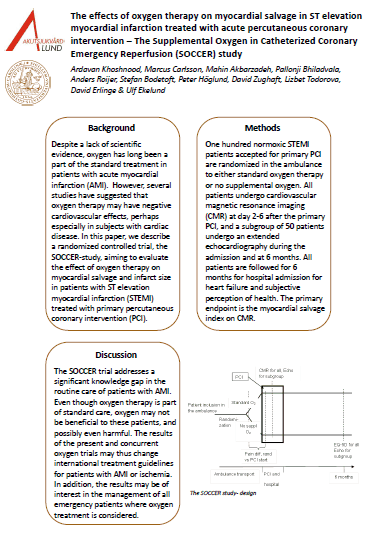The effects of oxygen therapy on myocardial salvage in ST elevation myocardial infarction treated with acute percutaneous coronary intervention – The Supplemental Oxygen in Catheterized Coronary Emergency Reperfusion (SOCCER) study
The SOCCER trial addresses a significant knowledge gap in the routine care of patients with AMI. Even though oxygen therapy is part of standard care, oxygen may not be beneficial to these patients, and possibly even harmful. The results of the present and concurrent oxygen trials may thus change international treatment guidelines for patients with…


![The ABC of Vertigo at the Emergency Department [Swedish]](https://ardavan.se/wp-content/uploads/2018/07/LT9.jpg)
![The Correlation Between Socioeconomic Status and Crime is Weak [Swedish]](https://ardavan.se/wp-content/uploads/2018/07/LKT1448_312px.jpg)
![Checklists and »crowdsourcing« for Increased Patient Safety in the Emergency Department [Swedish]](https://ardavan.se/wp-content/uploads/2018/07/LKT14_11_312px.jpg)
![Reply: Rectal Palpation Should of course Be Performed in Some Cases [Swedish]](https://ardavan.se/wp-content/uploads/2018/07/LKT14_08_312px.jpg)
![Routine Rectal Palpation in Acute Abdomen has no Proven Value: A Review of the Literature [Swedish]](https://ardavan.se/wp-content/uploads/2018/07/LT3-4.jpg)
![Shorten the Medical Education [Swedish]](https://ardavan.se/wp-content/uploads/2018/07/lt36.png)

![Overcrowding at the Emergency Department – A Swedish Definition is Needed [Swedish]](https://ardavan.se/wp-content/uploads/2018/07/lt16.png)